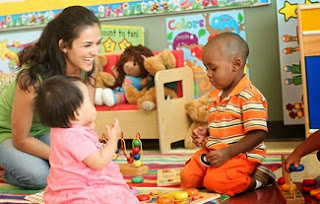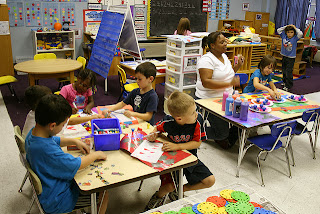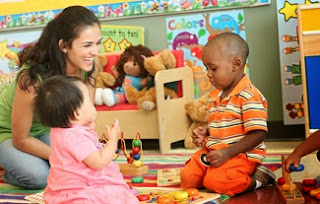Who is the leader?
A facilitator in group care of minors is a
person who participates in the education of children under 18 in their leisure
time and sometime of daily life (meals, hygiene, courtesy,). It has the
responsibility and develops fun time to pass values . It can make the
animation outside of school periods, before and after school, during school holidays
or on their vacation spots.
The animation is governed by the Labor Code,
the minimum age to be leader of 16 years. However, the minimum age required to
submit to the Certificate of Qualification to host functions (BAFA) is 17. It
is possible to animate without BAFA but disarm regulations (local youth) sets a
quota of unqualified personnel.
The leaders of group home children are
registered with decentralized departments responsible for youth (Departmental
Directorate of Social Cohesion, Youth and Sports). The guardianship service,
the organizer (employer) and the Director are responsible for verifying that
the leaders have not been subject to any restrictions expressly based on
criminal convictions. It is usually asked to show a criminal record 3 under 3
months, however, the legislation provides that the organizer after receiving
notification of the team with the DDCS the criminal record # 2 (See letter
Directive of the Ministry of Mar. 3, 2010).
The moderator is responsible for ensuring
the physical, moral and emotional safety of miners. He participated in the
implementation of an educational project with the director, responding to an
educational project of the organizer. It must also build a quality relationship
with minors, supervise and lead their daily lives. It should provide activities
and finally accompany minors in projects.
The number of facilitators for the
operation of a center is statutorily set at:
- A facilitator for eight children under 6
years
- A facilitator for 12 children aged 6
years and over (subject to change of encadrement 1 standards). .
This is valid for the administrative
operation of the center; in business it is quite possible to run a single
sports game where two teams of eleven players compete, for example. The
supervisory standards will be calculated on the overall structure but not by
room. This is the case for recreation centers where children are often
distributed by living according to their age: it may very well be one adult to
11 children as the whole of the structure, supervision standards are met.
In extracurricular time organizers such as
municipalities, are not required to declare their home to Youth and Sport,
which implies that they have no obligation coaching standards. The time of the
lunch break, called canteen is separate and is not subject to any regulation.
The facilitator may have dual - cap health assistant.
It must ensure the care and transportation to a hospital. There must be at
least one health assistant Structure.
The degree
Diplomas entitling functions facilitator
center rentals are fixed by law2. This function is fairly open and many degrees
allow them access. Note: It is of course possible to be leader without a degree,
but the center cannot exceed a certain quota of non-graduates to function (purely
administrative quota).
In 2009, are discussed for conventional
centers (excluding special cases):
• The certificate of competency to host
functions (BAFA);
• The certificate of competency as Director
(Fad);
• Pat State sports instructor (BEES) first degree;
• Professional Patent Youth, Popular
Education and Sport (BPJEPS);
• The State Patent facilitator technician
popular education and youth (BEATEP);
• Patent professional ability technician
assistant animator (BAPAAT), leisure option and young children;
• Certificate of Qualification first stage
of animation;
• The degree CALAS (Creator Atmosphere Fun,
Artistic and sports);
• The university degree of Technology (DUT)
specialty social work;
• Certificate of proficiency as monitor
-educator (CAFME);
• Some members of the military;
• The early childhood professional aptitude
certificate (CAP);
• Completion of the general university
studies (DEUG) STAPS;
• The STAPS License;
• The License science education;
• The degree of State for Youth, Popular
Education and Sport (DEJEPS);
• State the higher degree of youth, public
education and sport;
• The scientific and technical university
degree (DEUST) Entertainment and management of physical, sporting and cultural
activities;
• Social, educational, cultural and
recreational entertainment license;
• A certificate entitling to ongoing
national education (from primary to university);
• The degree of State on animation features
(DEFA).
Centers operated by the military, managed by
licensed scouts (Home Scouting), or managed as a host family also have their
specific side of the frame. It must refer to the specific regulations such host.
Their workplaces
A facilitator can work or pleasure,
commonly known holiday center, or «camp " and it can also work in home
leisure , commonly called " leisure center " but also structural
holiday (hotel ) in as a facilitator for children or class discoveries stays
supervised by school teachers , assisted by facilitators. We also see leaders
working in nursery and with the status of non- graduate.
The organizers can be diverse : the mayor
dealing with municipal recreation centers , associations that offer the same
service to private companies who organize those on holidays , or tourist
structures (such as Club Med , Pierre & Vacancies. . etc. )
The organizers recruit their managers. But
it is also possible that the organizers choose their own leaders.
Their working conditions
A facilitator is subject to the agreement
of the socio-cultural animation. It usually sign a contract Educational
Commitment , it is a contract in place by the application of Decree No.
2006-950 of 28 July 2006 on the educational commitment to the application of
law No. 2006-586 of 23 May 2006 on the voluntary associations and educational
commitment . This contract is definitely a good employment contract despite its
special status to the Labor Code in several respects. For example, the minimum
daily wage is 2.2 times the hourly minimum wage in force ( gross € 9.40 on 1
July 2012 ) or 20 Euros a day and do not take into account the actual time
worked . In terms of rest, EEC exception of labor law and must meet specific
compensation rules.
Into a holiday and discovery classes, the
facilitator can work 7:00 to 22:00 without interruption, even more because in
many trips daily meetings are held, and leaders are responsible for night surveillance.
In recreation center, the facilitator works
most often 10 hours per day (maximum allowed by law3) with a 20 minute break
after 6am. It should not work more than 48 hours per week.4. Given that
oversees leisure time outside school, its shifts are fluctuating. A facilitator
can work after school time (reception in the morning, time canteen and
childcare in the evening); it can work more on Wednesdays and during school holidays.
Its employers may be different and may have several contracts.
The facilitator may have a seasonal
employment contract, intermittent, part-time, fixed-term or permanent. If he
works for a joint can also be tenured public service and can also take examinations.
The professional development of the
facilitator is to become director of a structure in turn.
History of resorts and leisure
Paid leave since 1936, the resorts have
allowed children to go on holiday. Organizations arise and offer camps; the
Church also has to take the children on holiday. For more details on this period,
see page resorts and recreation.
In 1946, a first supervisor training was
born in 1973 and is born as the BAFA and the Fad.
With the emancipation of women, households
also need to keep the kids after school on Wednesdays and during school holidays,
hence the creation of outdoor centers and nurseries in the early 1990s.
It is known that in 1994 a large number of leaders,
with more than 45,000 trained facilitators. From the 2000s, the BAFA and Fad
experiencing significant decline whose causes are difficult to identify.
Accidents that occur in resorts and at output have caught the framing of their
responsibility in exercising this profession. Regulations harden on
supervision, safety, transport, accommodation, allowances hygiene and food
quality standards, which transforms the student job as full-time job.
There is a very professional it is mainly
applied to the BAFA do animation, employers require increasingly BPJEPS to run
a structure at the expense of the Fad. Professionalization of the sector is not
accompanied by a reassessment of wages for a job that requires a lot of
investment and responsibility, what motivates young people to move to other
more profitable sectors and with fewer responsibilities. As against the demand
for guards and care of children outside of school time is increasing.
http://fr.wikipedia.org/wiki/Animateur_de_centre_de_vacances_et_de_loisirs














